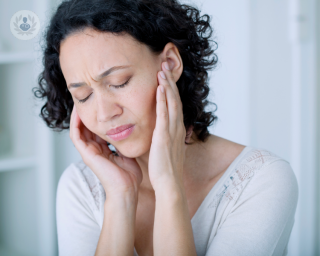Ménière's disease
Mr Angus Waddell - Otolaryngology / ENT
Created on: 10-23-2015
Updated on: 10-26-2023
Edited by: Aoife Maguire
What is it?
Ménière's disease (MD is a disease which affect the ears (usually, one at a time) and causes:
- a sudden ringing noise inside the ear (tinnitus)
- a roaring or buzzing inside the ear
- a feeling of fullness in the ear
The condition may also lead to sudden attacks of nausea, vomiting, vertigo and hearing loss (hypacousia). Attacks can occur in clusters or several times a week, or they may be separated by weeks, months or years. Vertigo attacks may become as severe as to cause loss of balance and falling down.

What causes it?
Although there are no known causes for this condition, according to some studies Ménière's disease is caused by blood vessels constriction, which in turn may have been caused by previous viral infections, autoimmune reactions, allergies or genetic factors.
The condition may appear at any age; however, the most affected age range is between 40 and 60 years old. People suffering from the following conditions have a higher chance of developing the condition:
- immune system conditions
- autoimmune diseases
- viral infections
- inner ear electrolyte imbalance
- vascular conditions
Finally, you’re more likely to develop Ménière's disease if you have a family history of the condition.
How is it diagnosed?
The first step for diagnosing Ménière's disease for an ear, nose, and throat specialist to look at your clinical history. The doctor will ask you if the symptoms last more than 20 minutes per attack, and if you suffer from any hearing loss.
You may also have some tests, including:
- electrocochleography – a record of the electrical response of the ear to sound to check if hearing loss originates from the inner ear or from the acoustic nerve
- nystamgus – this involves filling the ear with water or air to check if there are any issues with your balancing apparatus
To rule out the possibility of a tumour, which in its acute phase may cause symptoms much alike to those of Ménière's disease, you should also have a CT scan and a MRI scan.
How can Ménière's disease be treated?
As of today, there is no cure for Ménière's disease, but medication can help you control some of the symptoms.
A combination of psychiatric medications and H1-antihistamines, which fight the symptoms of vertigo, is the most common treatment. In most complex cases, you may also start taking antiemetics drugs, which can help with the vomiting, as well as anti-inflammatory drugs and immunosuppressive agents.
Some changes in your lifestyle can help you fight this condition:
- eating a low-salt diet (aimed at reducing water retention and thus the fluid build-up within the ear),
- stopping smoking
- avoiding alcohol
- cutting down on chocolate and caffeine
Psychotherapy can help you deal with vertigo attacks better and to improve your quality of life. Finally, if these treatments are not effective, the doctor may recommend ear surgery.














